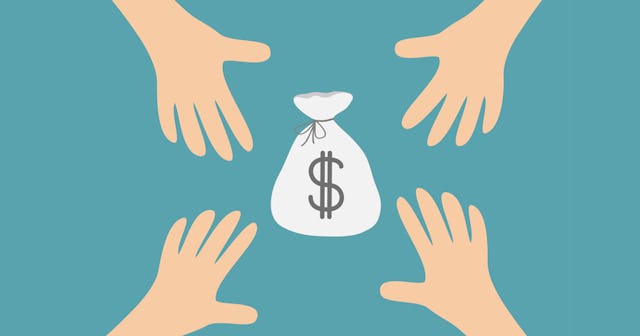What Do Millionaires Worry About? Leaving Their Kids Too Much Money, Apparently

Talk about “rich people problems” I’d like to have, am I right? Apparently, according to this CNBC article, a survey was conducted by The Motley Fool which asked 2,000 high net worth individuals, with a net worth over $1 million, about their feelings on large inheritances.
Shockingly, 67% of the individuals that took the survey, all agreed that their “top concern” was leaving TOO MUCH for their heirs! Imagine being a whole ass millionaire — or hell, a billionaire — and having the luxury of being able to question whether or not you’d be leaving too much money for your kids one day. How many of us would kill to have those kind of “problems”?
Listen … dad, mom, uncle, older sister, grandma, long lost cousin … whoever!
If you’re worried about leaving ME too much money, don’t! It’s fine! As Elsa once said … LET IT GO! I promise you I will have absolutely no problem at all figuring this one out!
And if you leave enough, I’ll even hire someone to help me take care of my finances. See, I’m already one step ahead of you.
But can you actually leave your kids too much money?
Survey takers (millionaires) weren’t worried about leaving too much just because.
Most of those who responded to the survey are convinced there are actual negative consequences for leaving too much. And sadly, they may be right, to an extent.
As a parent, I totally get why they’d be concerned about the effects a large inheritance could possibly pose for their heirs in the future. Have you ever sent your kid on a trip with “extra” money for snacks, and possibly a small toy from the gift shop, only for them to return with a blue tongue from all of the candy they purchased, no gift in hand?
Or hell … give your kid a $100 bill and tell them to pick out a few toys for holiday presents for their siblings, or cousins, and watch them struggle to not buy the biggest toy they find … for themselves!
Of course, large inheritances aren’t given to small kids though, as they’re reserved for young adults, and can’t be received until at least 18 year old, for these very reasons.
But we all know that kids don’t automatically “grow up” just because they turn 18. So the “side effect” concerns, such as a fear that the funds would be “used irresponsibly” or “kids would become lazy” (I guess because they won’t have to necessarily “work for it”) are valid.
MoMo Productions/Getty
Especially when you grew up with those very problems!
“The results and their responses were definitely guided by their own experiences, which is interesting because you get a sense from them that these were not unfounded concerns, but that they relate to their own experiences having inherited a lot of wealth,” Motley Fool research analyst Jack Caporal told CNBC Make It.
However, while I don’t necessarily believe that “we did this, so our kids will too” is a valid concern, as it’s our job as parents to teach our kids so they learn from our mistakes. I get it.
Too much of anything is a bad thing.
But I sure as hell still think it’s absolutely crazy that this is something people are actually worried about!
I mean … is it not our job, as parents, to teach our kids how to manage their finances? Especially if it’s such a large sum? My nine-year-old is currently learning how to do this as we speak, on every Target trip we take — because it’s my job to instill these good habits in her, despite what I may have learned as a child.
So I can’t understand why millionaires wouldn’t just prepare their kids for these kind of “problems.” You KNOW it’s coming! Help your kids succeed! No one said you had to drop a milli in their lap and let them drown in it on their own.
And if you’re still worried about how your kids will use their funds, my door and bank account is always open! Feel free to drop a few dollars in my daughter’s account. I promise you we’ll make you proud!
This article was originally published on